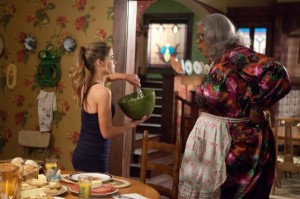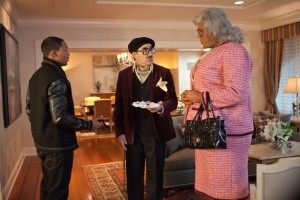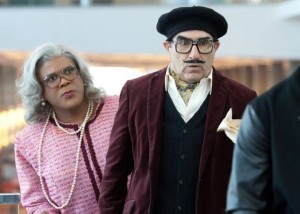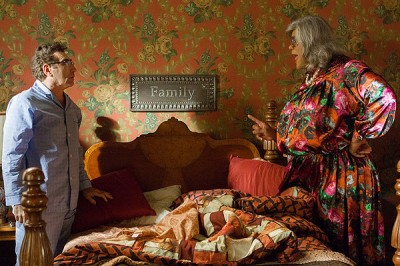
OK, here’s the truth — I actually enjoyed Tyler Perry’s Madea’s Witness Protection. You wanna make something out of it? I admit that I may have liked it more than I might have simply because I had just sat through the self-important dourness of People Like Us. I also realize that it’s equally possible that after a dozen movies since 2005, the man has simply worn me down. But isn’t it just possible that Perry has gotten better as a filmmaker, a writer and a performer? That’s my story and I’m sticking to it. This is by no means Perry’s most accomplished film. That distinction falls to For Colored Girls (2010), but neither are its aims as lofty. What it is, however, is his best and most agreeable Madea comedy, especially in the wake of last year’s fairly dismal Madea’s Big Happy Family.

Despite the usual run of bad reviews that have become more predictable and tired than anything Perry might ever produce, this latest film differs considerably from the earlier Madea outings. And, no, I don’t mean it’s because the film co-stars white people. That switch-up first happened when he teamed Alfre Woodard and Kathy Bates in The Family That Preys in 2008. This is, however, the first time that Perry has shared his comedic talents with another player of the calibre of Eugene Levy. But what really sets the film apart is that it’s the first Madea picture that is all but bereft of preachiness and the usual heaping helping of overheated melodrama. Oh, sure, there’s a church in the proceedings and a couple of visits to it. Plus, part of the plot involves the minister’s (John Amos) son (Romeo) having lost the church’s money by innocently investing it in a Ponzi scheme, but the usual spiritual lessons are nowhere to be found. All in all, this is Perry making a straighforward comedy — and surprisingly large stretches of it are pretty funny, as is the basic premise and the way it plays against expectations.

The idea is that investment CFO George Needleman (Levy) has been set up by his bosses as the fall guy for a Ponzi scheme — something that finds the innocent patsy and his family in trouble not only with the law, but with the mob as well. Somehow FBI lawyer Brian Simmons (Perry) hits on the idea that the safest place to hide the Needlemans is with George’s Aunt Madea (Perry) and his father, Joe (Perry) — something neither Madea nor Joe is keen on, except that it pays $4,000 a month. What Brian neglected to tell them is that the Needlemans are white. At first, it looks like it’s that fact that puts Madea off the idea, but it’s actually not her concern that a family of white folks in her neighborhood are about as conspicuous as she’d be at “a Republican convention.” What is surprising is that the film doesn’t milk this gag for more than it’s worth, but goes off in different directions that mostly work.

There are some peculiar omissions — or missed opportunities. Needleman’s nasty-tempered daughter (Danielle Campbell, Prom) doesn’t get the Madea dressing-down she deserves, and it might have been interesting to see Madea mix it up with gangsters. But I’m not really complaining. The film remains an amusing, ambling affair, and Perry’s portrayals of Madea and Joe have settled into a comfortable groove that feels less forced, while his usually too bland Brian has become more lively and less the barometer of normalcy. (The presence of Levy perhaps takes some of that burden off him.) There are also some points of interest in the writing — especially as concerns Joe’s past — that help make this one feel fresher than the last two Madea movies. Is this a great movie? No, but it’s a very likable one that certainly delighted the audience I saw it with. Did it delight me? Well, I’m not going to go that far, but I had a good time. Rated PG-13 for some crude sexual remarks and brief drug references.




the minister’s (John Amos)
Hey! Admiral Sissy-Mary is in this!
You mean that old polecat, that old so-and-so?
The TV watchers are in again.
The TV watchers are in again.
That’s what happens when you don’t lock the screen door.